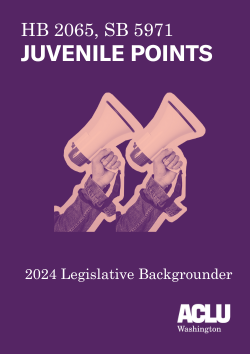In the 2023 session, the Legislature prospectively eliminated the automatic use of juvenile points in sentencing. This commonsense legislation updated Washington’s sentencing system and stopped the practice of automatically punishing people twice for crimes committed as children. This trailer bill would make this legislation retroactive and aligns the judicial system with established science around brain development and adolescent behavior, reflects best practices in sentencing, and begins to rectify the vast racial disparities in Washington’s prison system.
RETROACTIVITY IS KEY TO CORRECTING PAST HARMS
When the Legislature passed EHB 1324, it recognized that the use of juvenile points in sentencing results in unjust sentences and is not necessary for the preservation of public safety. However, by making the bill only apply prospectively and not retroactively, the bill’s impact was substantially minimized, leaving an estimated 809-1,437 individuals incarcerated and failing to address the significant historic disproportionalities created by juvenile points.1
[i]
Retroactivity is a vital part of any meaningful sentencing reform. It is fundamentally unfair to require people to serve vastly different sentences for the same offense, and retroactive reform ensures that the changes we make to our criminal justice system benefit the people most impacted by it. If the Legislature decides that a law is unjust going forward, it must also apply with equal force to those already impacted.
CURRENT LAW DOES NOT REFLECT MODERN BRAIN SCIENCE
Current scientific research has demonstrated that young people’s brains are different and that their decision-making and impulse control are still developing. The Washington Supreme Court raised questions of fairness and constitutionality regarding sentencing laws that do not consider developments in brain science.2
[ii] Modernizing Washington’s sentencing system to stop juvenile records from automatically increasing a person’s sentence will bring it into better alignment with brain science research.
Automatically increasing a person’s punishment because of an offense committed as a youth serves neither that individual nor public safety and raises the overall cost of corrections by effectively punishing people twice for the same offense.
THIS BILL ADVANCES RACIAL AND ECONOMIC JUSTICE
Due to the over-policing of schools and communities of color, Black, Indigenous, and other youth of color are disproportionately prosecuted and incarcerated, and therefore hold a disproportionate number of juvenile adjudications.
Youth who lack the financial resources to navigate the criminal legal system are also at a disadvantage, making them more likely to accrue juvenile adjudications. As a result, juvenile points are a quiet driver of disproportionality in sentencing. 41% of Native American People, 39% of Black people, 38% of Pacific Islanders, and 32% of Latine people currently incarcerated have one or more juvenile felony adjudications in their criminal history.3
[iii] Failing to address retroactivity in the use of juvenile points leaves long and racially disproportionate sentences in place.
PROMOTES FAIRNESS IN SENTENCING
Counting juvenile records in the calculation of adult sentences punishes young people twice for offenses committed when their decision making and impulse control have not yet developed to adult levels. For years, the United States and Washington Supreme Courts have decided that youth are and should be treated differently.4
[iv] However, under the system that calculated the sentences of those currently incarcerated, juvenile adjudications automatically impact the length of sentences imposed on adults. Punishments should not automatically increase based on behavior for which juveniles already served sentences.
THIS BILL WOULD NOT UNDULY OVERBURDEN THE COURTS
The Blake decision, which resulted in resentencings for people who had simple drug possession on their records, showed that the courts are fully capable of handling a massive class of resentencings. It also allowed the courts to develop efficient pathways for resentencing. The class of people affected by making EHB 1324 retroactive is much smaller than the number of resentencings that happened because of Blake.
HB 2065 and SB 5971 modernizes our state’s sentencing system as it relates to juvenile adjudications in a way that is developmentally appropriate and efficient, and that addresses historic racial disproportionality caused by the use of juvenile points.
[ii] State v. Houston-Sconiers, 188 Wash.2d 1
[iii] Public Records Request to Washington State Department of Corrections
[iv] Miller v. Alabama, 567 U.S. 460 (2012)

